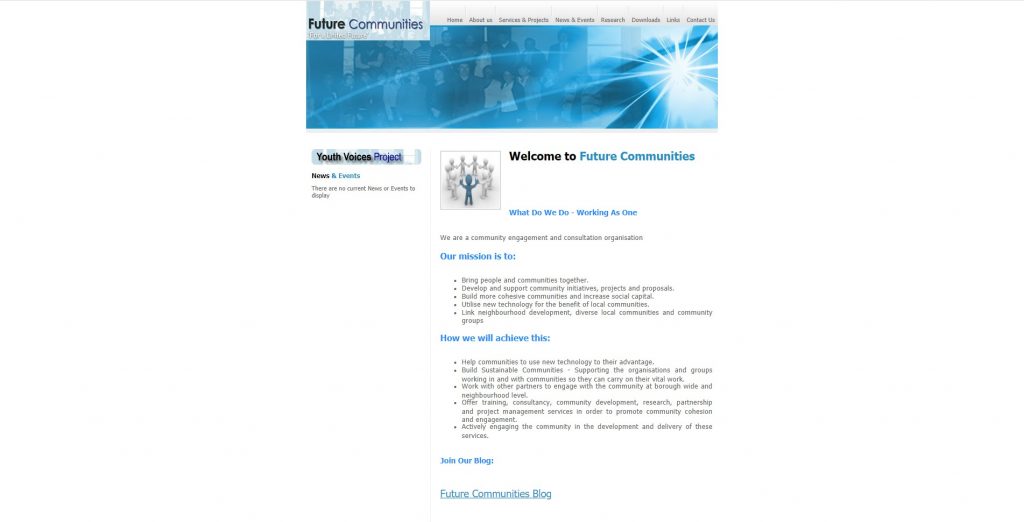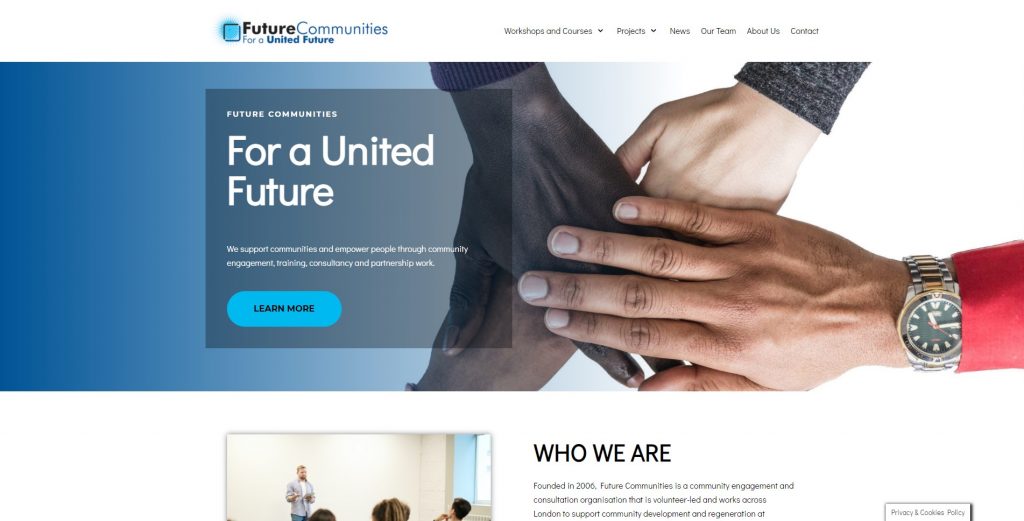Case Studies
Pathways 21 has a wealth of consulting experience in helping companies achieve success; here are a few cases
The consultancy team at Pathways 21 have extensive experience advising for a variety of companies across the private sector and the community-based sector, from funding advice to training, from marketing campaigns to editorial deliveries, plus digital services. Here are some citations of projects the team have successfully worked on.
2019-20
Case Study by Sybil Mayard
Sybil created a new website for Future Communities, a non-profit-making organisation based in South East London. Our previous website had been built over 5 years ago and badly needed improving with new features.
Sybil developed the site on the WordPress platform, liaised expertly with the key stakeholders including the site hosting company and ourselves, redesigned the site and added new pages to it, with updated features and graphics. She also carried out some excellent SEO work which ensured that Future Communities rose up significantly in Google rankings. All of this was expertly managed on time and on budget; the services of Pathways 21 and Sybil Mayard are highly recommended.
– Caroline, Director, Future Communities UK Limited
Phynd Me
Case Study by Gary Parker
Pathways 21 undertook a business development programme for Phynd Me, a digital services company based in the North West of England. The work included:
- Development of community opportunities strategy for the company
- Identification of potential community funding sources/projects for the organisation
- Identification of potential investors for the company
- Review of the business model
CESI
Case Study by Gary Parker
Pathways 21 undertook a capacity building and business development consultancy brief for CESI, a community organisation based in London. This work included:
- Consultancy and training
- Business plan support and development
- Capacity building business support and social enterprise development services
- Partnership development
- Place making and community engagement
We delivered a capacity building plan and helped to develop the new business plan for the organisation to develop its services over the next five years.
2015-18
Family Mosaic
Case Study by Gary Parker
Pathways 21 undertook a range of business development and fundraising activities for Family Mosaic, one of London’s largest housing associations at the time. The work included:
- Identification and development of partnership projects
- Identification of potential funding sources including private, public and community sources
- Development of community projects
- Development of funding applications
The work resulted in a range of new projects being developed and successful applications for over £100k of funding during the period.
2006-18
London Borough of Bexley – Strategic Transformation Partnership
Case Study by Stuart Crichton
During this period, Stuart supported Bexley across a larger number of diverse services to rapidly improve performance and outcomes. Different services and programmes over the 12 years included a variety of the management consultancy services available, although some encompassed all of them.
Between 2006 and 2011, the Strategic Partnership was governed by a Value for Money Board, whose regular membership comprised Stuart and the Directors of the council. Each financial year, the council budget was established including a financial efficiency target to enable a balanced budget to be delivered, in response to the annual government grant funding reductions. Both financial and quality efficiency targets were underpinned by a number of business cases developed by Stuart, from detailed reviews of target service areas. Some examples were waste collection & disposal methodologies, adult & children passenger transport operation and contracting, corporate customer contact and web enablement, back-office process engineering, corporate procurement methodology and contracting & contract management techniques. The financial and quality efficiency business cases were signed off by the Head of Service and the other corporate areas potentially affected such as finance, ICT and HR; then fully implemented in the next stage of the partnership by Stuart working closely with the Service Heads. During the 5-year period, the Strategic Partnership delivered in excess of £150 million in financial savings, with £60m in annual savings continuing from year 6 on an ongoing basis. In addition to this many service areas also delivered a substantial improvement in quality and customer experience.
An example case study where most of the consultancy services were provided as an integrated package was at the Bexley Adult Education Centre (now known as The Learning and Enterprise College) between 2011 and 2014.
Stuart carried out a Business Health Check during the summer of 2011 in response to a growing financial deficit at the College and in response to the findings was immediately requested to take over leadership of the organisation as an Interim Principal.
At that point (mid financial year) the College was projecting a deficit of £800,000 on a budget of c£3 million.
A high priority at the outset was to establish robust financial monitoring and reporting to understand what the true financial position was and what future financial year forecasts were if action wasn’t taken rapidly, enabling more robust and realistic business and financial planning.
The morale of the organisation was very low and the realisation that costs would have to be saved from the headcount exacerbated this.
As the Principal, Stuart’s priority was to strengthen the management team’s working, image and performance by engagement with the organisation through regular open and honest communication of the business plans and performance, whilst displaying values that in turn we expected all staff to embrace. Changing the culture to be more flexible to changes that were essential to changing marketplace; more business focussed with an emphasis on measurement of performance. Performance management and continuous improvement were priorities.
Stuart as another high priority had a key role in managing upwards to change how the College was strategically led by the Board of Governors. Clearly, strategic leadership had been lacking in the past which contributed to the predicament it was in. He redeveloped the terms of reference, framework and the membership of the Board by working closely with and certain instances coaching the council Senior Management Team, who the College Board ultimately should have been responsible to historically.
After 6 months of Stuart being appointed at year end, the deficit was eradicated and the following financial year achieved a surplus, which continued for the following two financial years that Stuart was in post. This was not achieved simply through cost reduction but additional income generation, improving bad debt collection, marketplace pricing structure reviews and bidding effectively for the adult education sector grant funding options.
During 2013 under Stuart’s leadership, the College was rated “Good” by Ofsted, in contrast to “Needs Improvement” before his involvement prior to 2011, safeguarding existing funds as well as opening up further adult education funding streams. Also over this 3 year period, stakeholder satisfaction was routinely measured with continuous improvement in all categories of student and staff, as well council officers and councillors.
During Stuart’s interim leadership, a number of substantial ‘invest to save’ business cases were developed and approved by the council to strengthen the College’s curriculum offer, including an accommodation development strategy to additionally provide training for Bexley’s adults with severe learning difficulties in such areas as independent living and employment.



